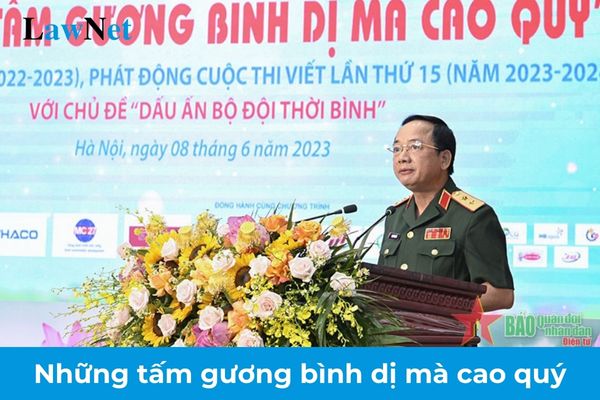What is the sample entry for the writing contest "Những tấm gương bình dị mà cao quý"? What are the eligibility requirements for granting assistance to students in extremely disadvantaged communes of Vietnam?
What is the sample entry for the writing contest "Những tấm gương bình dị mà cao quý"?
The writing contest "Những tấm gương bình dị mà cao quý" is an occasion to honor individuals who live simply but have made high contributions and noble acts, spreading profound humanistic values within the community.
- Time for submission of entries: From December 8, 2024, to July 31, 2025 (based on the email sending time or the postal mark on the envelope).
- Methods for submission of entries
+ By postal mail: Send to People’s Army Newspaper, No. 7 Phan Dinh Phung, Hanoi; clearly state on the envelope: Journalism entry for the 16th writing contest "Những tấm gương bình dị mà cao quý" (2024-2025).
+ By email to one of the following addresses: [email protected]; [email protected]; [email protected]; [email protected]; [email protected].
To create an entry for the writing contest "Những tấm gương bình dị mà cao quý", it is necessary to clearly identify the subject or event to be showcased.
Participants may refer to the following sample entry for the writing contest "Những tấm gương bình dị mà cao quý":
|
The Teacher and the Daily 32km Journey to Deliver Knowledge to Remote Regions In a remote mountainous area in the North of Vietnam, there is a teacher named Tran Van Toan. For over 10 years, he has overcome numerous challenges to bring education to children in highland areas. His journey is not only about traversing rugged roads but also a story of dedication, sacrifice, and boundless love for his students. |
Note: The above content is for reference only.

What is the sample entry for the writing contest "Những tấm gương bình dị mà cao quý"? (Image from the Internet)
What are the eligibility requirements for granting assistance to students in extremely disadvantaged communes of Vietnam?
According to Article 4 of Decree 116/2016/ND-CP, the eligibility requirements for granting assistance to students in extremely disadvantaged communes of Vietnam are as follows:
- For primary and secondary school students, one of the following eligibility requirements must be satisfied:
+ They are boarding students studying at ethnic boarding schools;
+ They are students whose parents or guardians and themselves have permanent residence in extremely disadvantaged communes, studying in primary and secondary schools located in Category 3 areas, extremely disadvantaged ethnic and mountainous regions; in extremely disadvantaged communes along coastal and island areas.
They live far from school: At least 4 km for primary students and at least 7 km for secondary students or difficult terrain, challenging transportation: crossing a river or stream without a bridge; overpasses, mountain peaks; landslide-prone areas.
+ They are students whose parents or guardians and themselves have permanent residence in Category III areas, extremely disadvantaged ethnic and mountainous regions, studying in primary and secondary schools located in Category II ethnic and mountainous regions. Living far from school or having difficult terrain as prescribed in Point b, Clause 1 of this Article.
- For upper secondary school students who are ethnic minorities, the following eligibility requirements must be met:
+ They are studying at high schools or high school levels in multi-level schools;
+ They and their parents or guardians have permanent residence in Category 3 areas, extremely disadvantaged ethnic and mountainous regions; in extremely disadvantaged communes along coastal and island areas.
They live far from school: A distance of 10 km or more or difficult terrain, challenging transportation: crossing a river or stream without a bridge; overpasses, mountain peaks; landslide-prone areas.
- For upper secondary school students who are Kinh, in addition to the conditions stated in Clause 2, Article 4 of Decree 116/2016/ND-CP, they must also be members of poor households.
What are the allowances for meals, accommodation, and rice for students in extremely disadvantaged communes eligible for assistance in Vietnam?
According to Clause 1, Article 5 of Decree 116/2016/ND-CP regarding the allowances for meals, accommodation, and rice for students in extremely disadvantaged communes eligible for assistance in Vietnam:
- Meal allowance: Each student is supported monthly with 40% of the statutory pay rate, for no more than 9 months/school year/student;
- Accommodation allowance: For students who have to self-accommodate because the school cannot provide boarding accommodations, they receive monthly support of 10% of the statutory pay rate, for no more than 9 months/school year/student;
- Allowance for rice: Each student receives monthly 15 kg of rice and is eligible for no more than 9 months/school year/student.

